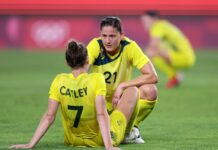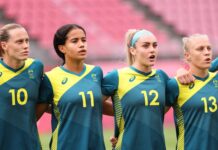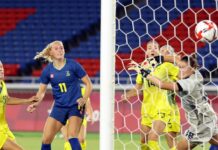

| Head Coach | Hege Riise |
Group: | E |
| Confederation: | UEFA | Ranking: | England: 6 Scotland: 23, Wales: 32 (NI: 48) |
| Federation: | FA (England), SFA (Scotland), FAW (Wales), IFA (Northern Ireland) | ||
| Social Media: | |||
Great Britain will make their first Olympic appearance since the London 2012 Games where they reached the quarter-finals. Due to the four nations having separate associations, FIFA has consistently taken the line that they would not allow a British team to enter the Olympics unless all four associations agreed. Scotland, Wales, and Northern Ireland refused to play ball for Rio 2016 but relented this time – England’s fourth-place finish at the 2019 World Cup had opened the door for Team GB once more.
Squad
Goalkeepers
Midfielders
Forwards
Defenders
Reserves
Team selection was always going to be the big bone of contention for this competition given the huge pool of players from the four nations available to coach Hege Riise. Since the initial squad announcement, there has been a degree of frustration echoed by fans and pundits alike at some of the names in the team.
A regular criticism thrown at Phil Neville as Lionesses coach was his reliance on the same group of players regardless of present performance levels. This now seems to be recurring issue with Riise’s GB squad. The first of several selections to raise eyebrows was the original inclusion of goalkeeper Karen Bardsley. The 36-year-old had just returned from injury and hadn’t accrued significant game time at her new club, OL Reign. However, Bardsley dropped out of the GB squad in early June with injury. Her replacement is Chelsea’s Carly Telford, who has only played a handful of games over the past two seasons due to the sensational form of Ann-Katrin Berger.
Team GB has a large pool of hugely talented goalkeepers who have been in top form all season which makes Telford’s selection somewhat puzzling. Sandy MacIver has been outstanding for Everton and fully deserves to be rewarded for her form. Additionally, Lee Alexander has been reliable for both Scotland and Glasgow City in major competitions over the past five years. Both goalkeepers can consider themselves exceptionally unlucky to have missed out.
Demi Stokes’ name did not feature very often in the media’s predicted Team GB squads, but she was announced in Riise’s. Stokes has suffered with injury for much of 2021 and her performance levels upon returning were below her best. Stokes’ inclusion meant that there was no room for Alex Greenwood who has been a far more consistent performer this season both for club and country.
Elsewhere, it surprised a number of people that Erin Cuthbert was not selected due to the energy, drive and dedication that she always offers any team she plays for.
Non-English players selected include Scotland stars Kim Little and Caroline Weir along with Wales’ Sophie Ingle. Northern Ireland’s players were overlooked to the immense frustration of Northern Ireland international Rachel Furness who told the BBC “…no-one from Northern Ireland was even considered. We weren’t even part of the long list [of 50+ players] originally put forward. We haven’t been respected as a nation.” Riise’s counter that NI players presently lack big-game experience was a worthy riposte.
Coach
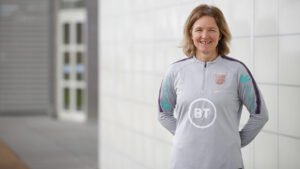

In terms of pedigree, Team GB have one of the best in Hege Riise. The 51 year-old Norwegian has won the World Cup (1995), Olympics (2000) and European Championships (1993) as a player with her country – one of only three women in history to have won all of these major competitions.
Whilst most of Riise’s playing career was spent in Norway with Team Strømmen, she had a two year spell in Japan with Nikko Securities Dream Ladies and two seasons with Carolina Courage in the USA. In a fourteen-year international playing career, Riise earned 188 caps and scored 58 goals, earning the Golden Ball at the 1995 World Cup.
After retiring from playing, she began coaching Team Strømmen in Norway’s Toppserien whom she led to a runners-up spot in both the league and cup in 2008 as well as being involved with Norway’s U23 side. She then had three years as assistant coach with the USNWT before going back to Team Strømmen, now named LSK Kvinner, where she spent eight years from 2012 as assistant and then head coach. During this spell Riise led the club to five Toppserien titles, five Norweigan Cups and a place in the Quarter-Finals of the UEFA Women’s Champions League in 2019.
Last Olympics
Team GB’s previous appearance at the Olympics was in 2012, when they took part as host nation. Hope Powell’s side topped a group containing Brazil, Cameroon and New Zealand before succumbing 2-0 to Canada in the quarter-finals.
Read more: Canada Olympic Preview
Qualifying Path
Team GB qualified due to England’s fourth-place finish at the 2019 World Cup. With England hosting the 2021 Women’s European Championships, it means that the vast majority of Riise’s squad have not played competitive international football since losing to Sweden in the third/fourth place play-off in France 2019. Scotland and Wales both suffered extremely disappointing qualification campaigns for the Euros while Northern Ireland, who have no players in the squad, clinched a historic qualification.
The Strengths
Attack. Fran Kirby could walk into any team in the world right now. Then there is Lauren Hemp. The Norfolk-born Manchester City player is not one that captures headlines in the way that other FAWSL strikers do. However, she has been going about her business showing consistent improvement for three seasons now and is ready to burst onto the world stage.
Ellen White cannot be ignored either. Whilst she is not quite the penalty box predator that she was a season or so ago, she still scored 10 goals in the FAWSL, which made her the third highest-ranked British player in the league’s scoring charts behind Fran Kirby and Chloe Kelly, who is currently injured.
The Challenge
Defence. All of the goalkeeping and defensive spots have gone to England players, yet their persistent defensive calamities since the World Cup cannot be overlooked. In fourteen games played since France 2019 the Lionesses have won just four and lost seven, with too many goals conceded due to basic errors. Too often, defenders and goalkeepers who are in world-class form for their clubs produce below-par performances in a national shirt. The nadir was reached in the Lionesses most recent encounter when they gifted Canada both their goals in the North American side’s 2-0 win at Stoke.
Key Players
Ellie Roebuck
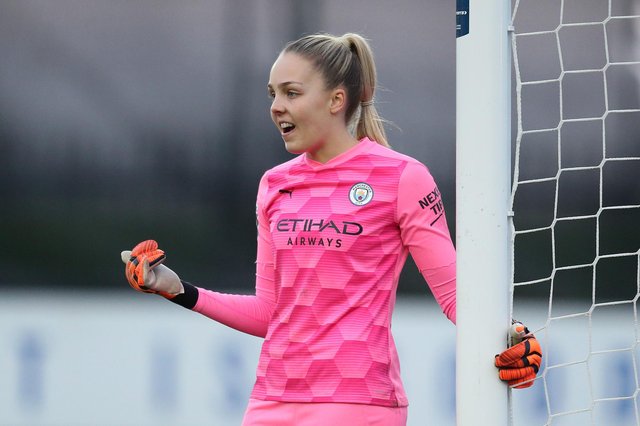

Given England’s regular defensive slips in recent games, Ellie Roebuck could potentially play a major role for Team GB in Tokyo. The 21-year-old Sheffield-born keeper has been hugely impressive over the past two seasons for Manchester City.
Due to Phil Neville’s reluctance to move on from the Carly Telford and Karen Bardsley era, Roebuck only has seven international caps. She has though been playing top-level games since a young age and was a squad member in England’s third-placed U20 World Cup team in 2018.
Starting at Sheffield United’s Centre of Excellence, Roebuck joined Manchester City at the age of 15. Two years later she signed her first professional contract with the North-West club. Part of the side that won the 2019 and 2020 FA Cup and 2019 Conti Cup, Roebuck also won the inaugural FAWSL Golden Glove award for the 2019/20 season.
Opposition teams will have noted a tendency for Roebuck to come off her line and challenge in the air at set-pieces with mixed results, but as a shot-stopper she is outstanding.
Lucy Bronze
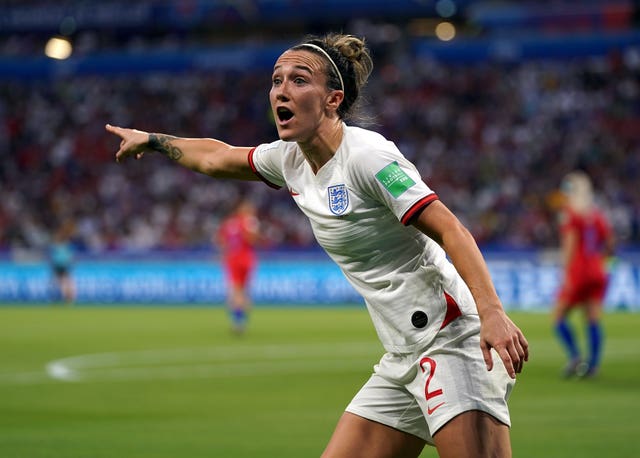

No England or GB article is complete without some reference to Lucy Bronze. The 29 year-old North-Easterner has consistently been one of the best full-backs in the world for a number of years.
Her international career started with a fairytale call up to England’s U17 squad, who finished fourth in the U17 World Championship. She would also go on to be part of the England U19 squad who won the World Championship in 2009 and, a year later, was in the side who finished as runners-up to France in the same competition.
Bronze’s senior debut came in 2013 against then-World Champions Japan at Burton-upon-Trent. Places in the 2015 and 2019 World Cup squads and at Euro 2017 also followed.
After those early days with Blyth Town and then Alnwick, Bronze progressed to Sunderland’s U12s side and joined their senior squad at the age of 16. 18 year-old Bronze was named as player of the match in the 2009 FA Cup Final when her Sunderland team went down 2-1 to Arsenal at Derby.
After a spell at University in the USA, she returned to England in 2010 and spent four years on Merseyside, first with Everton and then Liverpool being part of the Reds side who won back to back FAWSL titles. This was the beginning of the defender’s golden period. A move to Manchester City in 2014 saw her become part of the club’s unbeaten season before multiple Champions League and D1 titles with the star-studded Olympique Lyonnais side. Lucy Bronze is arguably the greatest English player of all time.
Fran Kirby
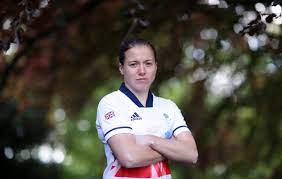

Last season, Fran Kirby experienced an incredibly challenging period after being diagnosed with pericarditis – an inflammation of the fibrous sac that surrounds the heart which produces sharp chest pains, fever, and a shortness of breath. After a long period away from the game, Kirby is back and in the greatest form of her life.
Kirby is a player who has had to overcome countless barriers in her career. The Chelsea star lost her mum as a 14-year-old and struggled with her mental health for several years afterwards. She is now a high-profile mental health advocate in England.
The Berkshire-born player has also had to overcome serious injuries. The period between 2016 and 2017 saw her suffer back to back injuries which led to a period of around a year out of the game during which she struggled to walk due to knee problems and bone edema (deep internal bruising).
Her first call up to the England squad in 2014 as a 21-year-old at then-second tier Reading marked her out as a special talent – it was the first time anyone not playing in the top flight of English football had been selected for the national side. A spot in the squad who finished third at the 2015 World Cup team was followed by a similar run at the 2017 European Championships and a fourth-place finish in France 2019.
The reigning FAWSL player of the year, Kirby is at the peak of her powers.
One to watch – Lauren Hemp
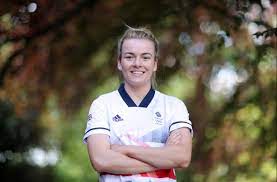

Lauren Hemp largely flies under the radar due to the presence of so many world-class players in the FAWSL, but Manchester City’s pacey young striker is a growing power in the game.
The 20-year-old started out at her local team in the rural town of North Walsham, Norfolk, before joining Norwich City Ladies in 2008. At the age of 15 she moved to Bristol City where she scored on her debut against Watford.
A two time FA Cup winner, Hemp has represented England at all levels from U15 upwards and captained her country at UEFA’s U17 Championships in 2017. Part of the team who finished third at the U20 World Cup a year later, she now holds six senior caps.
Whilst Hemp may not score as many goals as the likes of Kirby and White, she has a strong physical presence combined with real pace which is a nightmare for defenders to combat. Hemp plays with real intent and has the makings of a superstar.
Prediction
Ultimately it depends on which Team GB side turns up. Despite the ongoing defensive worries, this is still a side who are capable of winning a medal. GB leaving their group should be a given and anything less than a semi-final spot should result in major questions being asked.
Matches
| Date | Local Time | AEST | Venue | Team A v Team B |
| 21/7/2021 | 8:30 PM | 9:30 PM | Sapporo Dome | Great Britain vs Chile |
| 24/7/2021 | 7:30 PM | 8:30 PM | Sapporo Dome | Japan vs Great Britain |
| 27/7/2021 | 8:00 PM | 9:00 PM | Ibaraki Kashima Stadium | Canada vs Great Britain |
Follow Beyond 90's coverage of the Olympics.


